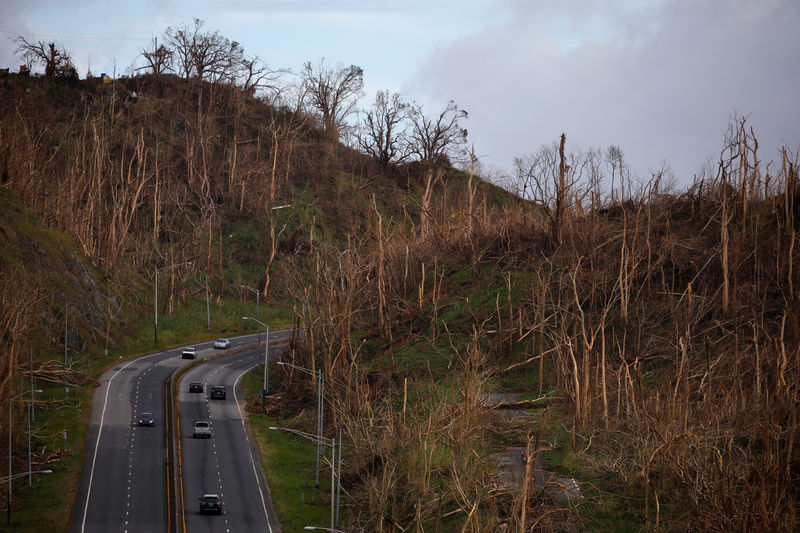By Laila Kearney and Robin Respaut
NEW YORK/SALINAS, Puerto Rico (Reuters) - The hurricane that levelled Puerto Rico last month has given fresh impetus to a decades-old argument on the island: that the U.S. territory would fare better financially as a U.S. state.
For Fermin Seda, 68, a retiree in the southern city of Salinas, there is no doubt.
"I want statehood," Seda said. "I think it would be better than what we are now."
Puerto Rico's status as a U.S. commonwealth means its 3.5 million American citizens do not pay federal taxes, vote in presidential elections or receive proportionate federal funding on programs like the Medicaid health insurance system for the poor.
For Jose Fuentes, chairman of Puerto Rico Statehood Council, a pro-statehood organization in Washington, Puerto Rico would have been in a better position to handle the blow from Hurricane Maria if it had the income and political power of a state.
Becoming a state would strengthen the political standing of the island, which currently has only a single non-voting member of Congress, and increase its eligibility for federal aid, Fuentes said.
Maria was the strongest storm to hit Puerto Rico in 90 years and her devastation "really bolsters the case for equal treatment for Puerto Rico,” said Jake Johnston, an international research associate at the Washington think tank Center for Economic and Policy Research.
Puerto Rico's stagnant economy and mounting debt have left the island with old, vulnerable infrastructure and buildings and a limited capacity to rebuild, Johnston said.
The creaky infrastructure was no match for Maria's fierce winds and water and likely hampered the emergency response, as officials struggled with a near-total power outage, and a lack of water, fuel and communications, he said.
VOTE IN FAVOUR
Changing the statehood question has been a hotly debated topic. Puerto Ricans voted overwhelmingly in favour of statehood in June, with 97 percent support, although the turnout was less than a quarter of eligible voters.
"How can we still have a colonial territory with more than 3.5 million U.S. citizens without access to equal rights or have the same political power?" Governor Ricardo Rossello said on Monday. Rossello, who campaigned on a push for statehood, had said in June that Congress should act on the vote.
Making the non-binding vote reality requires action from Congress, but the Republican-controlled House of Representatives and Senate is not likely to act for a territory that leans Democratic.
The amount of federal funds flowing in and out of the island would change dramatically if it were a state: it would receive as much as 76 percent more federal funds for the four biggest U.S. programs impacted under statehood, including Medicaid and Supplemental Security Income, according to a 2014 analysis by the United States Government Accountability Office (GAO). However, in turn, Puerto Ricans would have to pay federal income tax.
One thing that would not change with statehood is Puerto Rico's standing with the Federal Emergency Management Agency: FEMA's obligations to Puerto Rico are the same as to a state.
Democratic leaders in Congress and some residents in Puerto Rico have accused the Republican administration of being more sluggish in its response than it would to a disaster on the U.S. mainland. But FEMA has defended its aid effort for the island.
"I go to bed every night knowing that I have done the best I can to marshal all of these federal resources" to the island, FEMA administrator Brock Long told CNN last week.

With our without statehood, FEMA said in a statement it "will be here for years to come, helping Puerto Rico not only in its response, but also its recovery."